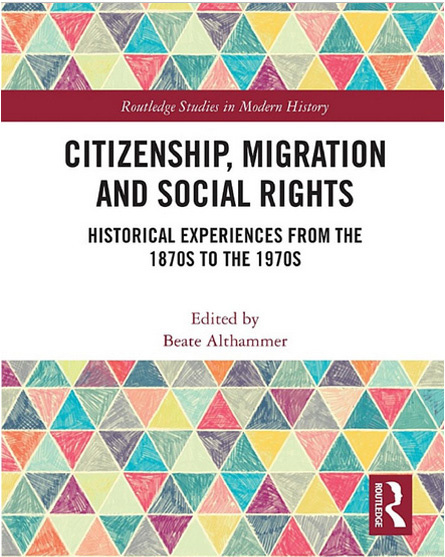
Dr. Simon Gerards Iglesias, former Research Fellow at CRC 1342, contributed a chapter to Beate Althammer's anthology "Citizenship, Migration and Social Rights. Historical Experiences from the 1870s to the 1970s." This volume was published as part of the book series "Routledge Studies in Modern History".
Argentina's social policy for immigrants in the interwar period
For some time now, the tensions between migration and the welfare state have sparked heated public and academic debates. Little is known about the historical connections between immigration and emigration and the effects and meanings of the emergence of modern welfare states. In a new anthology published by Routledge, this question will be explored from a transnational perspective with studies on different countries.
Simon Gerards Iglesias' chapter discusses Argentine immigration and welfare policies in the interwar period, focusing on those designed for Europeans. Recalling that Europe was a continent of mass emigration in the 19th and early 20th centuries, he shows how a key destination country - Argentina - contributed to the globalisation of welfare discourses that were originally an exclusively European affair. Gerards Iglesias argues that Argentina's efforts in the international socio-political arena were primarily rooted in the ambition to make the country attractive to European immigrants again after the First World War. He illustrates this concretely with the example of workers' compensation - the branch of social security whose internationalisation generally progressed most rapidly. However, Gerards Iglesias also points out the inconsistencies in Argentina's migration policy. For example, although the government concluded several bilateral agreements with European states on occupational injury benefits, it did not ratify the corresponding ILO convention until 1950. And while on the one hand it displayed pro-immigration rhetoric on the international stage, on the other it successively raised the barriers for potential immigrants at the national level. Argentina's political elites, the chapter shows, were torn between the pros and cons of immigration, which in any case always meant European immigrants, while migrants of other than "white" European descent were always unwelcome.
Publications:
Hüther, Michael / Gerards Iglesias, Simon (2022): Wirtschaftliche Entwicklung durch Rückschritt – zu den Perspektiven der russischen Volkswirtschaft, in: Russland-Analysen, Nr. 426, S. 2-6.
Gerards Iglesias, Simon (2022): Inmigración y empresariado transnacional en Argentina a finales del siglo XIX. Los Weil y los Staudt, entre Alemania y Argentina". Cuadernos del Archivo VI/1, Nr. 10 (2022): 26-45.
Gerards Iglesias, Simon (2022): Argentinische Sozialpolitik und die Internationale Arbeitsorganisation (ILO), 1919-1943. Debatten, Konflikte und Kooperationen. Dissertation, Universität Bremen.
Simon Gerards Iglesias studied political economy and economic history in Heidelberg, Göttingen and Buenos Aires. From 2019 to 2022, he worked as a researcher at the CRC 1342 and completed his doctoral thesis on the historical development of social policies in Argentina under the supervision of Prof. Dr. Delia González de Reufels. He currently works at the German Economic Institute in Cologne.













